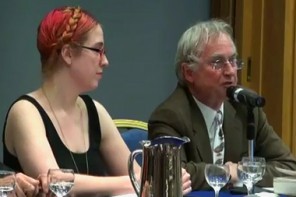TIKAL, GUATEMALA —This morning, my husband and I hiked the ancient Mayan ruins here, once one of the largest urban centers of the pre-Columbian civilization. Standing at the foot of one imposing temple, our guide informed us that this is where human sacrifice was believed to have been practiced, a significant ritual in the Mayan religion. The chosen sacrifice might be an enemy warrior, virgin, or infant.
Following purification rites, the victims were laid across round stones, their hearts cut out and their blood poured into a cup. The priest climbed with the blood to the top of the temple, where he would mix it with a concoction of hallucinogenic mushrooms and drink it. Looking out over the people gathered below, the priest saw visions, which he reported to the masses, who embraced what he had to say as truth.
While musing over this tale, I started thinking about a topic that I’ve long been curious about. Did evolution play a role in the creation of religion? And, conversely, did religion play a role in human evolution?
In other words, is there a selective advantage to being religious? (Obviously not for the sacrificed.) Or is religion the result of other cognitive processes that provided their own selective advantages?
Fortunately, there are people out there way smarter than me who also think about these things. PZ Myers wrote about this very same subject on his blog Pharyngula just a couple weeks ago.
In his post, Myers referenced a paper titled “The origins of religion: evolved adaptation or by-product?” published last month in Trends in Cognitive Sciences. The paper makes the point that it’s a little bit of both. Religion may have originated as a by-product of cognitive functions, but it later may have helped shape our community structures and enhanced social cohesion.
Here is the abstract:
Considerable debate has surrounded the question of the origins and evolution of religion. One proposal views religion as an adaptation for cooperation, whereas an alternative proposal views religion as a by-product of evolved, non-religious, cognitive functions. We critically evaluate each approach, explore the link between religion and morality in particular, and argue that recent empirical work in moral psychology provides stronger support for the by-product approach. Specifically, despite differences in religious background, individuals show no difference in the pattern of their moral judgments for unfamiliar moral scenarios. These findings suggest that religion evolved from pre-existing cognitive functions, but that it may then have been subject to selection, creating an adaptively designed system for solving the problem of cooperation.
As Myers summarizes:
Because humans are dependent on cooperation for survival, religion could have provided an internal bias to promote social cohesion, to promote feelings of guilt and fear about defecting from the group, and also to act as costly signals—you knew you could trust an individual to be a loyal member of your group if they were willing to invest so much effort in playing the weird religion game, just to get along.
However, another interesting finding is that researchers concluded that being religious does not necessarily equate with being moral. Rather, people are more likely to make moral judgments based on intuitive belief rather than from one’s religious background:
In the future, more experimental research is needed to probe the actual relationship between folk moral intuitions and intuitive beliefs about afterlife, gods and ancestors. It seems that in many cultures religious concepts and beliefs have become the standard way of conceptualizing moral intuitions. Although, as we have discussed, this link is not a necessary one, many people have become so accustomed to using it, that criticism targeted at religion is experienced as a fundamental threat to our moral existence.
In other words, a religious society isn’t necessarily a more moral society.



